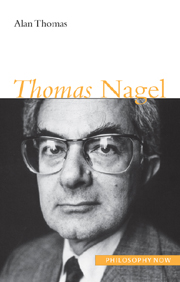Book contents
- Frontmatter
- Contents
- Preface
- Abbreviations
- 1 Subjective and objective
- 2 Understanding, knowledge and reason
- 3 Placing the mind in the physical world
- 4 The possibility of altruism
- 5 Practical objectivity, freedom and a realistic autonomy
- 6 Normative ethics: Nagel's hybrid ethical theory
- 7 Justice, equality and partiality
- Conclusion
- Notes
- Bibliography
- Index
6 - Normative ethics: Nagel's hybrid ethical theory
- Frontmatter
- Contents
- Preface
- Abbreviations
- 1 Subjective and objective
- 2 Understanding, knowledge and reason
- 3 Placing the mind in the physical world
- 4 The possibility of altruism
- 5 Practical objectivity, freedom and a realistic autonomy
- 6 Normative ethics: Nagel's hybrid ethical theory
- 7 Justice, equality and partiality
- Conclusion
- Notes
- Bibliography
- Index
Summary
In the overall structure of The View from Nowhere, Nagel's continued discussion of how the demands of objectivity apply to practice extends from his consideration of the problem of free will into moral philosophy. The concept of autonomy forms a natural bridge between these two sets of problems. Moral philosophy is conventionally divided into “meta-ethics” and “normative ethics”, and Nagel's presentation broadly follows this division. However, in the absence of any clear way of demarcating first-order from second-order questions in ethics, now that the subject is not taken to be restricted to conceptual analysis, this distinction has become largely a matter of customary usage. Nagel's discussion moves freely between meta-ethical and normative issues. My primary focus in this chapter will be on the transformation in Nagel's Sidgwickian ideal of objectivity in practice, discussed in the previous two chapters, when it is placed in the new framework of The View from Nowhere.
Moral objectivity: theoretical and practical
Throughout its history, moral philosophy has considered the problem of moral objectivity in two main ways. The first asks whether moral thought can aspire to the kind of objectivity exhibited by theoretical knowledge; the second construes ethics as an exercise not of our capacity for theory, but of our capacity rationally to direct our action. The Possibility of Altruism showed clearly that Nagel works in the latter tradition, and that fundamental commitment remains unchanged in The View from Nowhere.
- Type
- Chapter
- Information
- Thomas Nagel , pp. 163 - 206Publisher: Acumen PublishingPrint publication year: 2008



